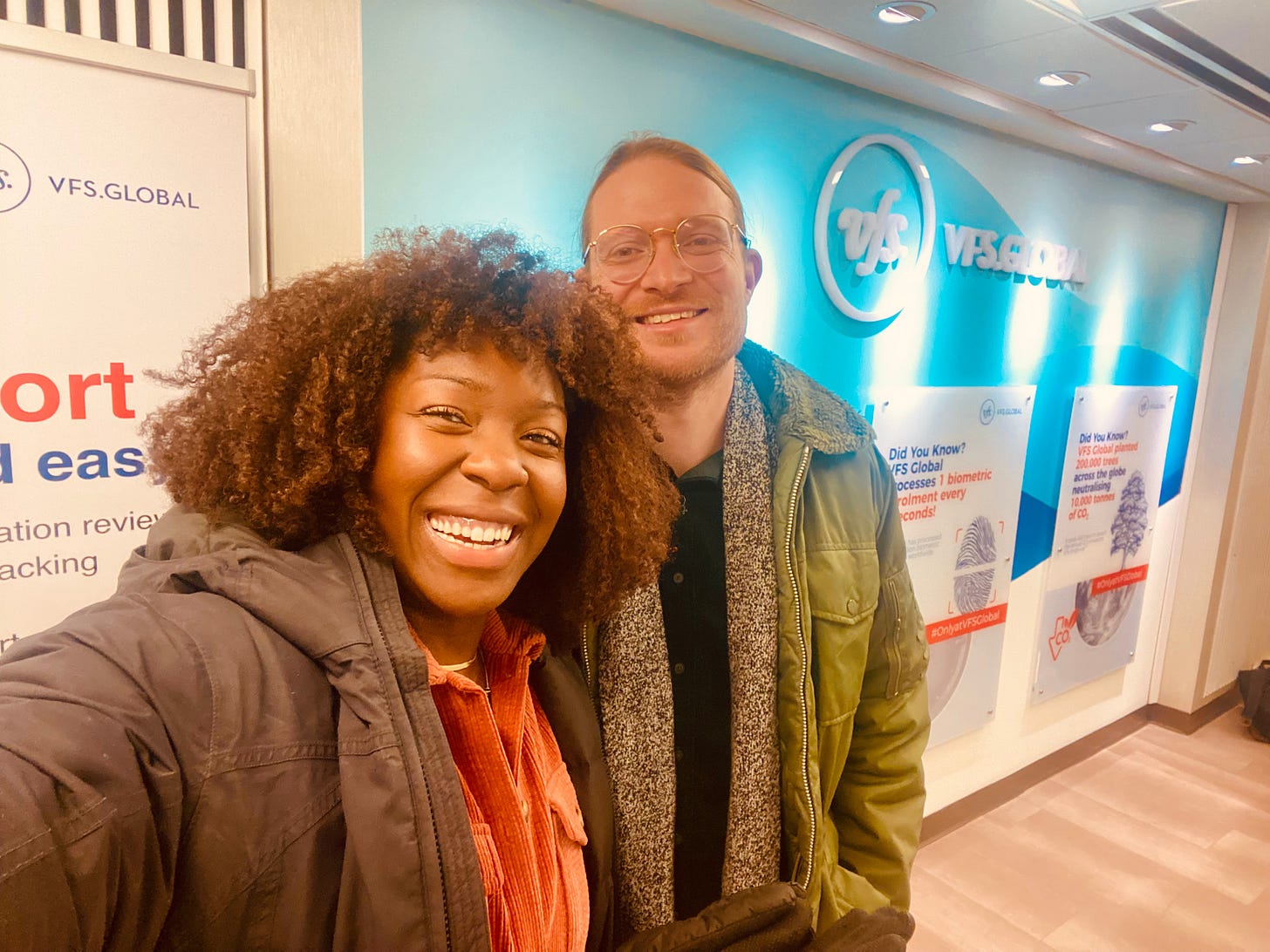
There were a variety of reactions from family and friends when my wife Ashley and I first announced that we’d be leaving the United States to move to Lisbon, Portugal.
Close friends were excited for us—already aware that moving abroad was a dream of ours—but also disappointed by the reality that our relationships would no longer be nourished by proximity. Others were confused, curious why anyone would leave the “greatest country in the world,” the land of opportunity people migrate to, not from.
None of this surprised us. We didn’t expect everyone to understand our reasons for wanting to leave. We were fully prepared for difficult conversations and questioning that sought to pinpoint all the ways we hadn’t thought our decision through. Mostly, though, everyone was respectful and wished us well. Some even promised to come visit once we were settled.
But that was all before November. After the election, something shifted.
It’s not like we didn’t see the election results coming. The timing of our move was no coincidence, after all. Unlike eight years prior, when we felt blindsided by Trump’s upset victory over Hillary Clinton, we were already acquainted with America’s true nature, its proclivity for strongman politics, its tendency to be enveloped by conspiracy theories and false narratives, its obsession with keeping straight white men firmly atop the social hierarchy.
We weren’t taking any chances this time. Our trust that Americans would do the right thing was nonexistent. By Election Day, we already had a visa appointment in D.C. booked, our house was listed on the market, and several pieces of furniture had been sold.
The looming threat of a fascist administration, this time less inhibited by checks and balances after an immunity ruling from the Supreme Court, wasn’t the only reason we were leaving. We craved the more connected, community-oriented lifestyle we had experienced while traveling through Europe the previous two summers. But choosing our peace over the incoming political chaos was a major factor and the primary reason we expedited our plans.
What we hadn’t accounted for was how a second Trump term would color our move. Our close circle remained supportive, even more understanding than before, but suddenly, we noticed a subtle tone of judgment when we shared our plans more widely around Durham, North Carolina, the small, progressive bubble we called home for over a decade.
The wording varied, but the sentiment was the same: “Won’t you stay and help us fight?”
Beneath their curiosity was a disheartened undertone, as if leaving was a surrender to the ominous direction America was headed. To some, our move felt less like a personal milestone and more like abandonment. As if we were throwing up casual ‘deuces’ while they braced for another four years of human rights violations and constitutional crises.
My excitement for our new life in Portugal slowly started to become guilt. Maybe we were being selfish. Not everyone could just pick up and leave like we could. We didn’t have aging parents or young children to look after like many of our friends. We were privileged enough to afford the high costs of immigration. We were organizing paperwork for our visa application while others were organizing a resistance. Staying to fight wasn’t a choice; it was their only option.
Not to mention, countless others would have benefited more from leaving than we would. As an interracial couple, we’ve taken the conservative backlash against diversity, equity, and inclusion particularly hard. Erasing what little progress America has made toward racial equity—or at least the acknowledgment of the lack thereof—has felt like a rejection of us, of our marriage. Truthfully, though, we aren’t the ones being laid off by DOGE. We aren’t the ones under threat of deportation by ICE. The sting of rejection and betrayed values hurts, but it pales in comparison to what others have endured.
It was also easy to forget how our response to Trump’s first win in 2016 had been entirely different. Back then, we were still attending an evangelical church, blissfully unaware of how deeply Christian nationalism had shaped the political landscape—or how entangled it was with white supremacy, especially in the South. We struggled to reconcile how the majority of our fellow congregants, people who preached love and compassion, could so easily and enthusiastically embrace Trump’s rhetoric.
During Trump’s first term, we channeled our pain into action. We immersed ourselves in learning, reading several books that outlined ways racism was embedded in America’s foundation. We organized block parties to foster community in our diverse neighborhood. We left our church and hosted a weekly discussion group of like-minded ex-evangelicals in our living room to unpack how the election had wrecked our faiths—and how we might try to put the pieces back together—over coffee and donuts. We donated more to causes we believed in, like nonprofits that addressed housing insecurity. We even opened our home to begin a chapter of co-living, providing our spare bedroom on a rotating basis to friends and family in need of a place to stay.
Back then, we hoped to embody the values the U.S. and our church community had failed to uphold. We were deeply invested in making things better, making things more whole, even if just on our block. Leaving for another country never crossed our minds.
But now, eight years later—we have little to none of that energy left. In planning our escape to Portugal, we had only been thinking of ourselves, our peace, our future. If there were any allegations of selfishness, we weren’t beating them, and that weighed on me.
Sometimes, the perfect song comes on just when you need to hear it. As I sat in our living room one evening listening to music, lost in thought, reflecting on our decision to leave the U.S. and the conflicting feelings of guilt and relief that came with it, a familiar song flowed through the speakers—Mirror by Kendrick Lamar, the closing track from his deeply personal Mr. Morale & the Big Steppers album.
Then came the chorus: “I choose me, I’m sorry.”
I had always loved the song, admiring its introspection and proclamation of self-love, but in that moment, the message hit differently. I’ve followed Kendrick’s career closely for over a decade, a devoted fan since before Good Kid, M.A.A.D City, his critically acclaimed breakthrough album, dropped in 2012. I understood the weight of his choosing himself—a man burdened with the expectations of being hip-hop’s moral compass, considered by many to be a “savior” of the genre and culture.
By choosing himself, he was stepping back from making music aimed at changing the world, which seemed to be his ambition on projects like To Pimp a Butterfly and DAMN., the latter of which became the first hip-hop album to win a Pulitzer Prize. Instead, he was prioritizing himself and his family. That didn’t feel like abandonment at all. It didn’t feel selfish. It felt like healing. And I was happy for him.
So why couldn’t I allow myself the same grace?
At that moment, I felt a small shift—an acceptance that choosing to leave wasn’t the same as turning our backs. That our departure wasn’t a rejection of the people still fighting, but an acknowledgment of what we needed, in this next chapter of our lives, to heal.
I still haven’t worked out the morality of it all, us leaving. I certainly don’t think we’re doing something noble or righteous by doing so. But I no longer feel guilty about it either.
Maybe it isn’t always morally bankrupt to be selfish. Maybe there’s a season for fighting and a season for healing, and maybe there are places, outside of the U.S., where it doesn’t feel required to choose one or the other.
We will still vote in every election via absentee ballots, which is our right (at least for now) as U.S. citizens living abroad. We’ll still stay as informed as we can without sacrificing our sanity. We’ll fly back to visit family and friends at least once per year.
But we’ll also build a new life, one that is rooted in presence rather than fighting and resistance, in joy rather than exhaustion. A life where we can wake up without the daily weight of existential dread, without constantly bracing for the next crisis.
We know that no place is perfect. Portugal has its own challenges—its own history of colonization, its own struggles with inequality. But here, we feel like we have space to breathe, to reconnect with ourselves and each other outside the pressures that shaped so much of our lives in the U.S.
Maybe one day, we’ll return. Maybe we won’t. But for now, we are choosing this. Choosing peace, choosing possibility, choosing ourselves. And for the first time in a long time, that feels like enough.
Thanks for reading! If you enjoyed this post, here are some ways you can support my work:





Hi! And welcome to Lisbon! My wife and I are from Atlanta and have been here for two years. We originally came for just two years to have an "adventure". About our second summer, we realized how much we like living here. We enjoy a car-free lifestyle, healthy food and a vibrant social circle. Now, we have jettisoned the exit date and are here until we are not. With the election of #47 and Republican capitulation, we have even more reason to stay. I often feel the guilt you mentioned and appreciate your feelings. It's hard to see our country suffer. We will continue to stay informed, stay involved and do what we can to support just causes from our home here in Campo Pequeno.
I am transgender. I am leaving. I am not sorry in the least.